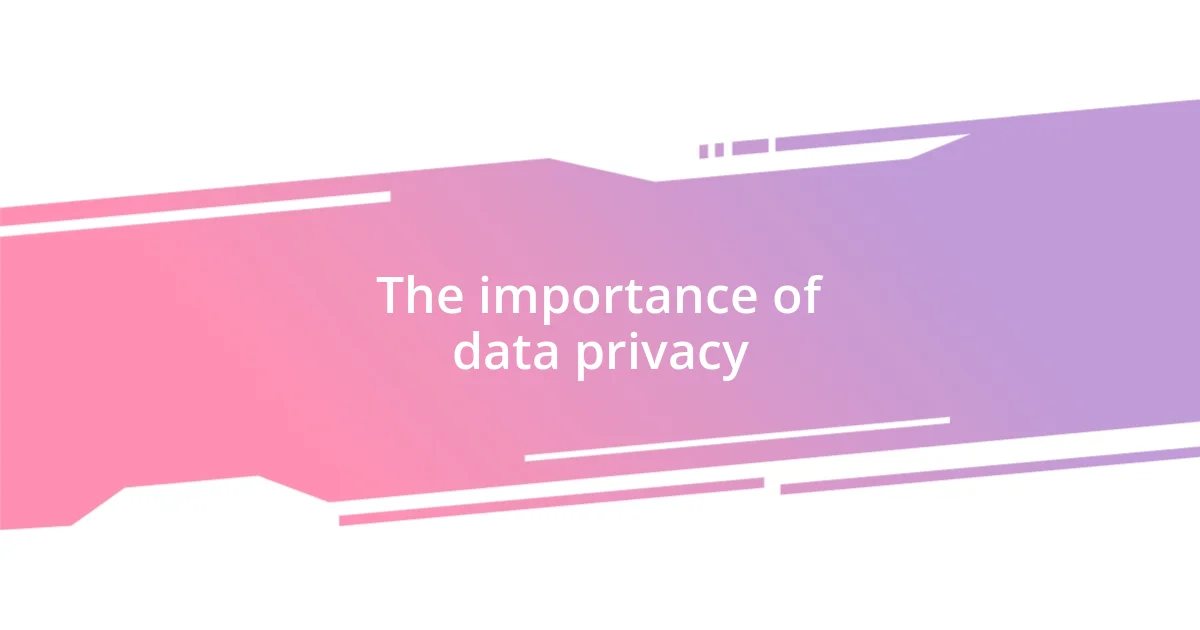Key takeaways:
- Data privacy is essential in fostering trust between consumers and brands, influencing shopping behaviors and brand loyalty.
- Consumers should actively manage their privacy settings and be cautious about the information they share to protect their personal data.
- The legal landscape for data privacy is evolving, with regulations like GDPR and CCPA empowering consumers but also presenting challenges for businesses.

The importance of data privacy
Data privacy is crucial in our increasingly digital world, where personal information is easily collected and shared. I remember a time when I was surprised to receive targeted ads that eerily aligned with my recent conversations. It made me wonder: how much of my data is out there, and who has access to it? This kind of overreach can foster feelings of vulnerability and mistrust.
As consumers, we often overlook the implications of sharing our data so freely. I used to think that targeted ads meant companies understood my preferences, but I’ve learned to appreciate the fine line between convenience and privacy invasion. The emotional weight of knowing that my online behavior could be scrutinized leaves me feeling uneasy—who really benefits from this data, and at what cost to my privacy?
Moreover, the importance of data privacy extends beyond individual experiences; it shapes the very foundation of trust in the digital marketplace. Have you ever hesitated to shop online due to concerns about data breaches? I have. Understanding that our information is safeguarded—or not—affects our willingness to engage with brands and services. When companies prioritize data privacy, they not only protect their customers but also enhance their reputation in a competitive market.

Understanding data collection methods
Understanding how companies collect data is central to grasping the complexities of digital advertising. It’s fascinating—and a bit unsettling—how many methods exist, often without our explicit awareness. The first time I realized my browsing history was being tracked, it struck me as intrusive. I remember thinking, do I really want my online actions monitored and analyzed? It felt like an invisible spotlight was shining on my preferences.
Data collection methods can include:
- Cookies: Small files stored on your device that track your online activity.
- Device fingerprinting: Identifying devices by their unique settings and characteristics.
- Social media tracking: Using your engagement on social platforms to inform ad placements.
- Surveys and forms: Gleaning information directly from users willing to provide personal details.
- Purchase behavior tracking: Analyzing past purchases to predict future buying habits.
The breadth of these methods often leaves me questioning the true cost of convenience. I remember when I filled out a customer feedback form, driven by the hope my insights could lead to better services, unaware that it would further feed the data-collection beast. It’s an irony that continues to resonate with me—wanting to enhance a service, yet contributing to a vast web of surveillance.

Impact of targeted advertising
The impact of targeted advertising is profound, shaping not just consumer experiences but also brand strategies. One time, I received a captivating ad that seemed to pop up just as I was contemplating a new purchase. This experience highlighted just how effective these ads can be; however, it also sparked a realization about how tailored these messages become at the expense of my privacy. It’s a tightrope walk between being relevant and feeling overly monitored.
Interestingly, while targeted ads can enhance user engagement and conversion rates for businesses, they can backfire if perceived as invasive. I’ll never forget the discomfort I felt when an ad appeared that not only referenced a private conversation but also tried to sell me a product I hadn’t yet searched for. This experience shows how precision can quickly tip into creepiness, driving customers away instead of attracting them.
The ripple effect of targeted advertising also influences how we perceive brands. If I see a company prioritizing my data privacy alongside their advertising efforts, I’m more inclined to support them. It raises a compelling question: should brands trade off some effectiveness for trust? I believe the answer lies in balance; effective advertising doesn’t have to come at the cost of consumer trust, and brands that recognize this will thrive in an era where data privacy is paramount.
| Aspect | Impact |
|---|---|
| Consumer Engagement | Targeted ads can effectively connect consumers with the products they need, enhancing shopping experiences. |
| Consumer Trust | Concerns over privacy can lead to distrust, pushing consumers away from brands that overstep. |

Balancing personalization and privacy
Finding the sweet spot between personalization and privacy can feel like walking a tightrope. Once, I encountered an ad that felt eerily accurate, showcasing products I had discussed with a friend just hours earlier. It made me wonder—how much of my personal life does the digital world invade to tailor experiences? This line between convenience and intrusion is something I think about regularly; it can be exhilarating to see ads that resonate with my interests, but I also find myself hesitating whenever I feel my privacy might be compromised.
In my experiences, I’ve noticed that while I appreciate the relevance of personalized advertising, the thrill can quickly erode into discomfort. For instance, after researching a sensitive health issue online, I was stunned when targeted ads began appearing for related products. It was a jarring moment that left me questioning who else was privy to my private queries. Do companies truly understand the emotional weight of the data they collect? This situation highlights the need for brands to adopt transparency and respect for consumers’ emotional boundaries.
Ultimately, brands that champion a balanced approach are the ones that resonate with me the most. When a company openly communicates its data practices, it fosters a sense of safety and trust. I often find myself gravitating towards those that prioritize my privacy while still delivering personalized content. Isn’t it possible for brands to innovate without sacrificing our comfort? I believe a future where personalization coexists with genuine respect for privacy isn’t just desirable—it’s essential for lasting customer loyalty.

Best practices for consumers
When it comes to protecting your data while enjoying ads, I believe consumers should take charge of their privacy settings. For example, I’ve made it a point to regularly review the privacy settings on social media and apps I use. By doing this, I ensure that I understand what information I’m sharing and can limit data collection to what I’m comfortable with. Have you done the same? I find it empowering to know I’m in control of my digital footprint.
Another best practice is to be cautious with the permissions you grant apps and websites. I once downloaded a seemingly harmless game that requested access to my contacts and location. It made me think twice—why does a game need that information? I decided to deny those permissions, and I urge others to scrutinize requests like that. It’s crucial to ask yourself: does this app really need this information, or is it just a way to collect data indiscriminately?
Lastly, I’ve learned the value of being selective about sharing personal information online. I’ve often refrained from entering details like my birthday or location on websites unless necessary. It feels like a small step, but protecting our personal data starts with being mindful of what we share. Have you ever regretted sharing something online? By adopting such practices, we not only safeguard our privacy, but we also send a message to brands about the importance of respecting consumer data.

Legal landscape of data privacy
Laws and regulations surrounding data privacy are rapidly evolving. For instance, the General Data Protection Regulation (GDPR) in Europe has set a high standard, emphasizing consumers’ rights over their personal data. Honestly, every time I read about its strict penalties for non-compliance, I feel a mix of relief and concern—relief for heightened protections, but concern for businesses navigating such extensive requirements.
In the United States, the landscape is a bit more fragmented, with states like California leading the way with their own privacy laws. When California passed the California Consumer Privacy Act (CCPA), it was a reminder that consumers can drive change. I remember how being informed about my rights under the CCPA empowered me to demand more transparency from companies. Does your state have similar measures? It’s encouraging to think that awareness can lead to action at the legislative level.
However, the challenge remains in harmonizing these diverse regulations across borders. As I follow these developments, I often wonder: how can brands keep up without compromising their marketing strategies? As a consumer, I see a mixed bag of implications—while I’m thankful for these protections, I also recognize the burden they can place on businesses. It’s a fascinating, if not complex, dynamic that shapes our advertising landscape daily.

Future trends in data privacy
The future of data privacy seems to be heading toward more user-centric models, where consumers have greater control over their data. For instance, I’ve recently noticed a growing number of apps prompting users to select their data-sharing preferences upfront, rather than burying them in lengthy terms and conditions. Isn’t it refreshing to have a choice right at the start? I find it encourages a more transparent relationship between businesses and consumers.
Another trend I’m keeping an eye on is the rise of privacy-first companies. These brands are pivoting away from traditional advertising models that rely heavily on data collection. Personally, I’ve encountered some that prioritize user privacy and offer services without tracking. I remember feeling pleasantly surprised when I discovered these options; it was reassuring to make purchasing decisions with companies that genuinely respect my privacy. Could this be a game changer in how we approach online purchases?
Artificial intelligence (AI) is also playing a significant role in shaping future data privacy trends. Tools that help consumers manage their permissions and secure their data are becoming more sophisticated. I can’t help but think of the last time I adjusted my settings with the assistance of an AI tool—I felt like I had a tech-savvy friend by my side guiding me. As we embrace these technologies, I wonder: will they empower us to reclaim our data, or could they lead to new privacy challenges? Regardless, I’m excited to see how these advancements unfold in the coming years.














